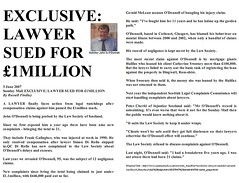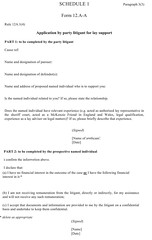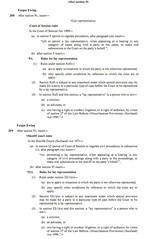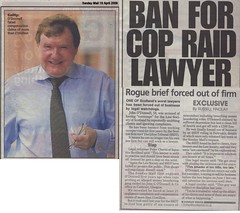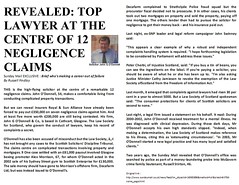 Law Society of Scotland will remain in charge of Scotland’s legal services market despite Legal Services Bill ‘reforms’. CONSUMERS of legal services in Scotland may have to wait for some time before they see any real benefits from the Legal Services (Scotland) Bill, which finally completed its ‘Stage Two’ hearings at the Scottish Parliament today, seeing yet more amendments & capitulations by MSPs to the Law Society of Scotland, almost rendering the bill worthless in terms of achieving an increase in consumer protection from Scotland’s notoriously poor legal services market.
Law Society of Scotland will remain in charge of Scotland’s legal services market despite Legal Services Bill ‘reforms’. CONSUMERS of legal services in Scotland may have to wait for some time before they see any real benefits from the Legal Services (Scotland) Bill, which finally completed its ‘Stage Two’ hearings at the Scottish Parliament today, seeing yet more amendments & capitulations by MSPs to the Law Society of Scotland, almost rendering the bill worthless in terms of achieving an increase in consumer protection from Scotland’s notoriously poor legal services market.
Supporters of the Legal Services (Scotland) Bill, including the consumer organisation “Which?" have apparently praised the almost ‘momentous’ occasion of the Justice Committee voting through a proposal to allow external investors (non-lawyers) to own up to 49% of existing law firms, should of course, investors chose unwisely to invest in them.
The Scottish Government had initially proposed to allow external investors majority ownership, which the Law Society of Scotland objected to, and the proposal was duly dropped. I reported on last week’s Justice Committee decision to restrict non-lawyer ownership of Scottish law firms here : Holyrood’s Justice Committee votes against majority non-lawyer ownership of law firms, saves investors from Scots legal world's organised crime gangs
While some still spin out the Legal Services Bill as a major advance for consumers of legal services in Scotland, the fact is that the trail of amendments, many of which were requested and even authored by the Law Society itself, have made the Legal Services (Scotland) Bill almost worthless to the ordinary Scottish consumer, compared at least with the benefits enjoyed by English consumers as a result of the passage of the Legal Services Act in England & Wales over three years ago by the previous UK Government.
The English version of the Legal Services Bill has already had the effect of creating a regulator, the Legal Ombudsman (LeO), which is so far enjoying favourable reports in the UK media over its ambitions & abilities to independently regulate the English legal services market. Even the Legal Complaints Service has made giant strides forward, compared with its Scottish Counterparts, currently the SLCC & Law Society of Scotland.
However, Scottish consumers will once again have to suffer the regulatory regime of the Law Society of Scotland who, if the Legal Services Bill becomes law, will be approved by Scottish Ministers to regulate the entire legal services market – lawyers & non-lawyers alike, making consumer choice almost like choosing the colour of a Model T Ford (you can have any colour as long as it’s black)
Curiously, “Which?” the chief proponent of the Legal Services (Scotland) Bill, are now reluctant to answer questions as to why the organisation has not done more to protest against the watering down of the Scottish Legal Services Bill, which is now a third rate example of its English counterpart.
Amazingly, for instance, little has been said about the fact consumers who lose out financially to dishonest legal representatives will, under the terms of the new Legal Services (Scotland) Bill, be forced to make a claim against the Law Society controlled “Guarantee Fund” – a compensation scheme run by the Law Society of Scotland to pay out client claims made against dishonest solicitors, but which is widely viewed by most who try to make a claim against it as being just as corrupt & protective of ‘crooked lawyers’ as the Law Society of Scotland’s infamous Master Policy, which a study by the Scottish Legal Complaints Commission last year linked to client suicides, information which was apparently covered up by the Law Society of Scotland for years.
Speaking this evening, a Holyrood insider said the now toothless nature of the Scottish version of the Legal Services Bill stemmed from the “poor presentation” of evidence by Which? & the OFT to the Scottish Parliament’s Justice Committee during its December sessions, which you can read about in my earlier report, accompanied by the video footage of the evidence session, here : OFT & Which? call for independent regulation of lawyers as Justice Committee hears evidence on Legal Services Bill
An aide to an MSP commented : “This was a pretty poor performance by the consumer lobby which caused some consternation with Justice Committee members. Lets just say msps felt the evidence was less than convincing, which ultimately allowed the Law Society a free hand in how the bill has shaped up since.”
Unsurprisingly, the Law Society of Scotland welcomed the many changes & retreats to the Legal Services Bill the society had requested and also went on to praise the Legal Services Bill as guaranteeing the ‘independence of the legal profession’ – a well known Law Society phrase roughly translating to “We won again, phew”.
The Law Society also welcomed the agreement at the Justice Committee today that ministers should not be able to influence the composition of the Law Society’s Council. However, to ensure that the functions of the Council and a new regulatory committee, established by section 93 of the bill, are kept separate (in other words, to create an illusion of transparency and laughable accountability within the Law Society) an amendment was also passed to make explicit that the Council should not interfere unduly in the regulatory committee's business. A proposal to set up a separate representative council was rejected.
The Law Society and many of its members had objected to the potential for ministers to have powers to stipulate who sat on its Council, the decision-making body for solicitors, stating that it would compromise the profession’s independence from government. The Council currently consists of up to 43 elected solicitors from across Scotland and up to nine co-opted solicitors from a range of legal disciplines. There are also four non-solicitor observers. This was such an important issue to the legal profession it sparked a threat by lawyers to break the Legal Services (Scotland) Bill, and forced widely reported retreats by the Scottish Government as I reported in an earlier article here : Scottish Government back down on lay appointments to Law Society Council as lawyers interests threaten to break pro-consumer legal services bill
Jamie Millar, President of the Society said he was pleased that that the committee had backed the commitment (capitulation) expressed earlier this year by Communities Safety Minister Fergus Ewing to bring forward amendments to ensure independence of the profession.
He said: “The Society takes its responsibility to protect consumers very seriously and has for many years had a number of regulatory committees with 50% solicitors and lay members to ensure that public interest is being represented and that action can be taken against solicitors who are not meeting the required professional standard. However, as a membership body we have a clear obligation to represent our members’ interests and provide the professional support that they require. It would have been contrary to the Society’s duties to its members to allow ministers, even as a last resort, rather than the profession alone to shape its Council and I think the amendments passed today will help ensure the right balance.”
“We all recognise that there needs to be a careful balancing act and that at times the tension between regulating and representing our members can create challenges, but I would echo Robert Brown MSP by saying it is a ‘creative’ rather than ‘destructive’ tension which helps to maintain the high standards that we expect our members to work to.”
The Society also supported an amendment today to strengthen the Scottish Legal Aid Board's obligation to monitor the availability and accessibility of legal services in Scotland. It will require SLAB to take into account relevant factors, relating particularly to rural or urban areas, to ensure there is no detrimental impact on the public’s access to legal services.
MSPs also agreed an amendment which at some future point would allow ministers to change the percentage of non-solicitors or regulated professional ownership of licensed legal services providers if necessary, however the Society believes that there needs to be a clearer specification under which ministers might act – so we can expect a summer filled of lawyers squabbling amongst themselves, with a resultant climb-down yet again from the Scottish Government when the Legal Services (Scotland) bill finally comes up for a vote.
Mr Millar continued : “The requirement to consult the Lord President, the Society, all other approved regulators and the OFT before making regulations to amend or repeal the section on majority ownership, offers some reassurance. However we do have concerns that if Scottish ministers have free rein to alter the percentages, this uncertainty might be a disincentive to investors. There is also a lack of specification of the conditions under which Scottish ministers would exercise those powers.
“There are to be further talks during the summer prior to stage 3 and we welcome the opportunity to discuss the bill further with Scottish ministers and MSPs.”
Not much of a consumer victory for wider access to legal services in Scotland, when the Law Society of Scotland – the very organisation which has caused tens of thousands of complaints over the years for its poor regulation and vice like grip over Scotland’s legal services market, still calls the shots on regulation, compensation, access to justice, ownership of law firms, certification of legal representatives … etc … almost one could say, no change at all for consumers while the legal profession gets away with co-opting ‘reforming’ legislation once again …
Background to the Legal Services (Scotland) Bill :
The Legal Services (Scotland) Bill originated from a ‘supercomplaint’ filed by consumer organisation Which? to the Office of Fair Trading in 2007, alleging lack of competition in Scotland’s solicitor only dominated legal services market. The Law Society of Scotland initially rejected the OFT’s call for an investigation into the Scottish lawyer monopolised legal services market.
The SNP controlled Scottish Government joined the Law Society and initially rejected any idea of legal services reform then, after the legal profession decided it would be better to take the issue and control it themselves, Justice Secretary Kenny MacAskill ‘changed his mind’ and the Legal Profession Bill was created, and was renamed to the Legal Services (Scotland) Bill on the suggestion of .. yes, you guessed it, the Law Society of Scotland.
The sheer scale of the amendments to the Legal Services (Scotland) Bill, many of which were requested by the legal profession itself, can be viewed on the Scottish Parliament’s website here : Legal Services Bill Committee page






